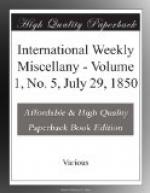MENDELSSOHN’S SKILL AS A CONDUCTOR.—In the spring of 1835. Mendelssohn was invited to come to Cologne, in order to direct the festival. Here we met again, and thanks to his kindness, I had the pleasure of being present at one of the general rehearsals, where he conducted Beethoven’s Eighth Symphony. It would be a matter of difficulty to decide in which quality Mendelssohn excelled the most—whether as composer, pianist, organist, or conductor of the orchestra. Nobody ever knew better how to communicate, as if by an electric fluid, his own conceptions of a work, to a large body of performers. It was highly interesting on this occasion to contemplate the anxious attention manifested by a body of more than five hundred singers and performers, watching every glance of Mendelssohn’s eye, and following, like obedient spirits, the magic wand of this musical Prospero. The admirable allegretto in B flat, of Beethoven’s Symphony, not going at first to his liking, he remarked, smilingly, that he knew every one of the gentlemen engaged was capable of performing and even composing a scherzo of his own; but that just now he wanted to hear Beethoven’s, which he thought had some merit. It was cheerfully repeated. “Beautiful! charming!” cried Mendelssohn, “but still too loud in two or three instances. Let us take it again, from the middle.” “No, no,” was the general reply of the band; “the whole movement over again for our own satisfaction;” and then they played it with the utmost delicacy and finish, Mendelssohn laying aside his baton, and listening with evident delight to the more perfect execution. “What would I have given,” exclaimed he, “if Beethoven could have heard his own composition so well understood and so magnificently performed!” By thus giving alternately praise and blame, as required, spurring the slow, checking the too ardent, he obtained orchestral effects seldom equaled in our days. Need I add, that he was able to detect at once, even among a phalanx of performers, the slightest error, either of note or accent.—Life of Mendelssohn.
* * * * *
There is a mutual hate between the virtuous and the vicious, the spiritual and the sensual: but the pure abhor understandingly, knowing the nature of their antagonists, while the vile nurse an ignorant malignity, pained with an unacknowledged ache of envy.
* * * * *
Superstition In France.—The Courrier de la Meuse says: “Witchcraft is still an object of belief in our provinces. On Sunday last, in a village belonging to the arrondissement of Verdun, the keeper of the parish bull forgot to lay before the poor animal at the usual hour its accustomed allowance of provender. The bull, impatient at the delay, made a variety of efforts to regain his liberty, and at last succeeded. The first use he made of his freedom was to demolish a rabbit-hutch which was in the stable. The keeper’s wife,




